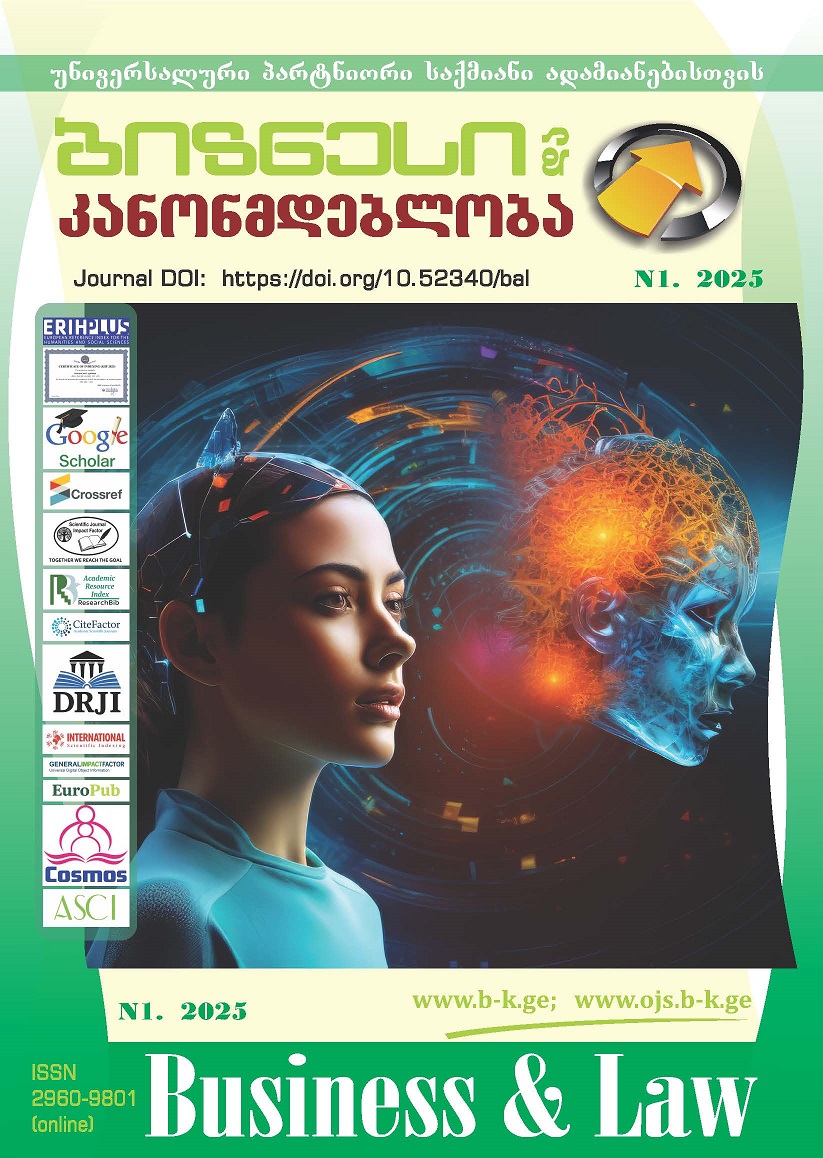ციფრულ ეპოქაში სტუდენტური მეწარმეობის ბარიერების გადალახვის ვექტორები - ხელოვნური ინტელექტის გავლენა
DOI:
https://doi.org/10.52340/bal/2025.18.01.01საკვანძო სიტყვები:
სტუდენტი, სამეწარმეო ბარიერები, სამეწარმეო განზრახვები, ფინანსური ბარიერები, ფსიქოლოგიური ბარიერები, საგანმანათლებლო მხარდაჭერა, ინსტიტუციური მხარდაჭერა, ახალგაზრდული მეწარმეობაანოტაცია
სტატიაში განხილულია დაბრკოლებები, რომლებიც ხელს უშლიან სტუდენტების ჩართულობას სამეწარმეო საქმიანობაში. ბოლოდროინდელ კვლევებსა და პოლიტიკურ ანგარიშებზე დაყრდნობით, მასში მოცემულია ამ ბარიერების კატეგორიებად დაყოფის გადამუშავებული ჩარჩო და უფრო დეტალურ ასახავს სტუდენტების სამეწარმეო განზრახვების ჩამოყალიბებაში ინსტიტუციური, კულტურული, აგრეთვე ინდივიდუალური გარემოებების დინამიკას. ნაშრომი უნივერსიტეტებსა და პოლიტიკის შემქმნელებს სთავაზობს სამეწარმეო საქმიანობისთვის ხელსაყრელი გარემოს შექმნის პრაქტიკულ რეკომენდაციებს.
წყაროები
Al-Fattal, A. (2024). Youth Entrepreneurship in the Middle East. Journal of Regional Economic Studies, 12(1), 22–43;
Alqahtani, A. (2023). Artificial Intelligence and the Ethics of Assessment in Higher Education. Journal of Moral Education and Technology, 12(2), 89–104;
Botha, A., Makhuzeni, B., & Van Wyk, D. (2021). Machine Learning for Entrepreneurial Competency Assessment. International Journal of Educational Technology in Higher Education, 18(1), 1–20;
Global Entrepreneurship Monitor (GEM) (2024/2025) Global Report: Entrepreneurship Reality Check. [online] Available at: [URL отчёта, если есть] [Accessed 2 July 2025];
Chen, J., Zhang, Y., & Liu, M. (2024). Artificial Intelligence in Entrepreneurship Education: A Scoping Review. Journal of Educational Innovation and Technology, 18(1), 45–62;
Ethikbeirat HRTech. (2020). Guidelines for the Responsible Use of Artificial Intelligence and Digital Technologies in HR Work. https://www.ethikbeirat-hrtech.de;
European Commission. (2020). Digital Education Action Plan 2021–2027: Resetting education and training for the digital age. https://education.ec.europa.eu;
Fayolle, A. (2015). Personal views on the future of entrepreneurship education. Entrepreneurship & Regional Development, 27(7-8), 527–543;
GEM Reports. Global Entrepreneurship Monitor, 2022/23. https://www.gemconsortium.org/report/gem-2022-2023-global-report;
Kröll, M., & Burova-Keßler, K. (2021). AI and Learning in the Context of Digital Transformation. In S. Nazir et al. (Eds.), Advances in Human Factors and System Interactions (pp. 36–43). Springer;
Liang, Y., Xie, Y., & Sun, H. (2021). AI-Driven Evaluation Systems in Entrepreneurship Education: Opportunities and Risks. Journal of Educational Computing Research, 59(8), 1589–1610;
OECD. (2021). Supporting Young Entrepreneurs. OECD iLibrary. https://www.oecd.org/cfe/leed/supporting-young-entrepreneurs. htm;
Rossmann, A., Zimmermann, A., & Hertweck, D. (2020). The Impact of Chatbots on Customer Service Performance. In J. Spohrer & C. Leitner (Eds.), AHFE 2020. Advances in Intelligent Systems and Computing (Vol. 1208, pp. 237–243). Springer;
Sedkaoui, S. (2018). Data Analytics and Artificial Intelligence for Smart Entrepreneurship. Wiley;
Xanthopoulou, P., & Sahinidis, A. (2024). Exploring the Psychological Determinants of Student Entrepreneurship. Journal of Innovation and Business Studies, 16(2), 91–112;
Zhao, H., Seibert, S.E., & Hills, G.E. (2005). The Mediating Role of Self-Efficacy in the Development of Entrepreneurial Intentions. Journal of Applied Psychology, 90(6), 1265–1272;
Zhu, Q., & Zhang, Y. (2022). Pedagogical Challenges of AI Integration in Higher Education: Towards Human-Centered Design. Computers & Education, 184, 104532.
ჩამოტვირთვები
გამოქვეყნებული
როგორ უნდა ციტირება
გამოცემა
სექცია
ლიცენზია
საავტორო უფლებები (c) 2025 ბიზნესი და კანონმდებლობა

ეს ნამუშევარი ლიცენზირებულია Creative Commons Attribution-NonCommercial-NoDerivatives 4.0 საერთაშორისო ლიცენზიით .

















